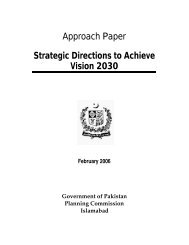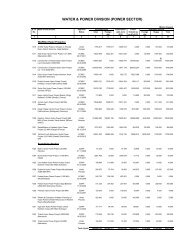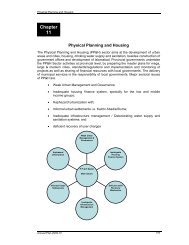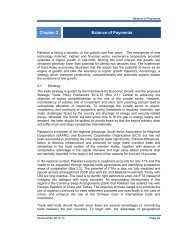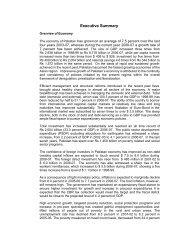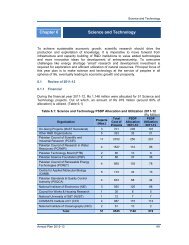Manual for Development Projects - Planning Commission
Manual for Development Projects - Planning Commission
Manual for Development Projects - Planning Commission
You also want an ePaper? Increase the reach of your titles
YUMPU automatically turns print PDFs into web optimized ePapers that Google loves.
Chapter-8<br />
basic objective of such a study is to ascertain the real worth of a project or programme as far as possible.<br />
Broadly speaking, evaluation may be defined as "a process which attempts to determine as systematically<br />
and objectively as possible the relevance, effectiveness and impact of activities in the light of the<br />
objectives". It is, thus, a critical analysis of the factual achievements/results of a project, programme or<br />
policy vis-a-vis the intended objectives, underlying assumptions, strategy and resource commitment. In<br />
specific terms, it makes an attempt to assess objectively the following:-<br />
(a) the relevance and validity of the objectives and design of the project/programme in terms of broader<br />
issues of development policy, sector/sub-sector priorities and strategies as well as other problems of a<br />
wider nature;<br />
(b) the efficiency and adequacy of the pace of progress of the project/programme where the focus is mainly<br />
on managerial per<strong>for</strong>mance and productivity;<br />
(c) the effectiveness of the project/programme - a major part of an evaluation exercise-in realizing the<br />
intended objectives from a variety of angles; and<br />
(d) the identification of reasons <strong>for</strong> the satisfactory or unsatisfactory accomplishment of the results of the<br />
project/programme and to deduce critical issues and lessons which may be of relevance to other on-going<br />
and future projects/programmes of a similar nature.<br />
Types of Evaluation<br />
8.3 Evaluation, can be applied <strong>for</strong> different purposes as well as to a specific activity, project or programme.<br />
It is not restricted to the completion stage only but involves periodic investigations at many stages. The<br />
different types of project evaluations carried out are: (i) ex-ante evaluation, (ii) on-going evaluation and<br />
(iii) terminal evaluation/ex-post evaluation. The ex-ante evaluation/pre-approval appraisal has already been<br />
discussed with methods and techniques in Chapter-5. The on-going evaluation is carried out by the<br />
organization of its own to re-assess the projected feasibility of the PC-I content because of the time lag,<br />
while external evaluation is done by an agency other than the body involved in the implementation of a<br />
project. On-going and post-completion evaluation are discussed below:-<br />
(a) On-going/Mid-term Evaluation<br />
The main purpose of an on-going/mid-project evaluation is to assist the project management to make<br />
appropriate adjustments in the changed circumstances or to rectify any shortcomings in the original design,<br />
so as to improve its efficiency and overall per<strong>for</strong>mance.<br />
(b) Post-Completion Evaluation<br />
Page 2 of 5<br />
The purpose of an ex-post or post-hoc evaluation is to discover the actual, as opposed to the projected,<br />
results of implementing a project. The aim of evaluation is primarily to compare the actual outcome of the<br />
project with the projections made at the appraisal stage. The examination of different aspects of the project<br />
can provide important lessons derived from experience <strong>for</strong> the new projects. The overall impact of the<br />
project will result in a number of effects which can be classified as costs and benefits, direct and indirect or<br />
tangible and intangible. Ex-post evaluation takes place after the completion of the project and is often more<br />
in-depth as it focuses on the analysis of impact. Besides, it is time-consuming, costly and calls <strong>for</strong> persons<br />
http://hd2/pc/popup/ch8_p.html<br />
9/23/2010



